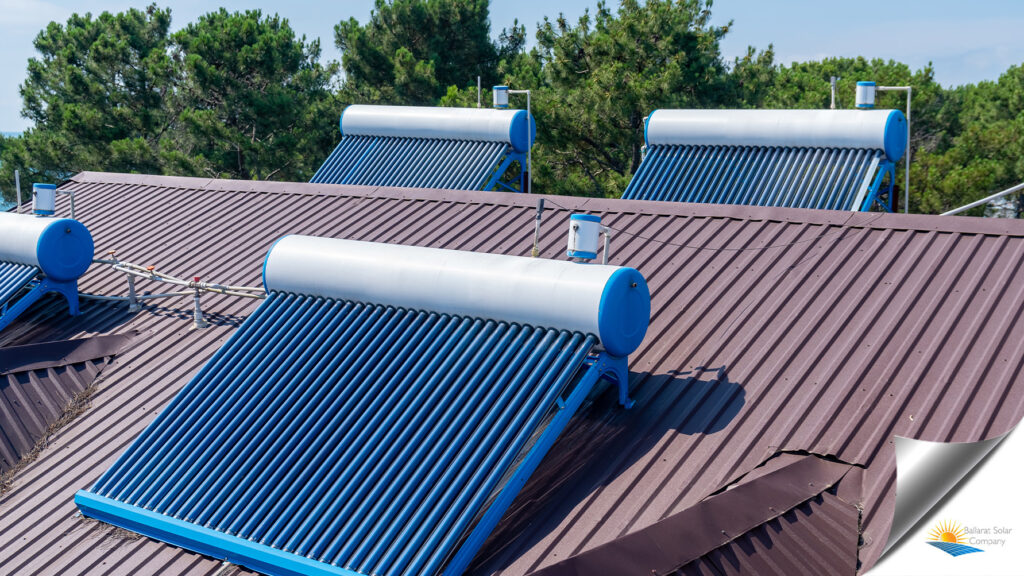In recent years, solar hot water systems have become a go-to choice for Australian homeowners looking to cut down on energy bills while embracing eco-friendly living.
With their ability to harness the power of the sun to heat water, these systems provide a sustainable and cost-effective alternative to traditional electric or gas water heaters. However, like any home appliance, solar hot water systems are not immune to issues, which can sometimes leave homeowners in a bit of a bind.
So we talked to a plumbing mate to give you a deeper understanding of how plumbing plays a crucial role in keeping your system running smoothly.
Whether you’re experiencing lukewarm showers, inconsistent temperatures, or low water pressure, this article will guide you through the most common problems in solar hot water systems.
With insights from both a solar expert and a plumber’s perspective, we’ll help you troubleshoot and solve these issues so your system continues to perform at its best.
What is a Solar Hot Water System?
Before diving into troubleshooting, it’s helpful to understand how solar hot water systems work and the different types available.
How Solar Water Heating Works
Solar hot water systems are designed to capture the sun’s energy using solar collectors, which heat water directly or indirectly via a heat transfer system. This heated water is then stored in a tank, ready for use when needed. The primary advantage of these systems is that they reduce reliance on traditional energy sources, making them both environmentally friendly and cost-efficient over time.
Types of Systems
There are two main types of solar hot water systems commonly used by homeowners:
Active Systems
These systems use pumps to circulate water or a heat transfer fluid through the collectors to the storage tank. Active systems can be further divided into direct (solar water heating) and indirect (solar space heating) systems.
Passive Systems
These rely on natural convection to circulate water through the system, meaning no pumps are required. Passive systems tend to be simpler and more cost-effective but may not be as efficient in certain climates or situations.
Each system type has its advantages and drawbacks, but they all face similar common issues that can impact their performance.
Common Problems in Solar Hot Water Systems
Although solar hot water systems are generally reliable, they can experience issues over time. Identifying these problems early can help prevent more serious damage and reduce repair costs. Below are some common issues that homeowners may encounter, along with potential causes and simple solutions to get your system back on track.
1. Insufficient Hot Water Supply
One of the most common complaints from solar hot water system users is an insufficient supply of hot water. This can be frustrating, particularly during peak usage times. Several factors may contribute to this issue, ranging from weather conditions to system size.
Possible Causes:
- Cloudy weather: Solar hot water systems depend on sunlight, so overcast days can reduce the energy available to heat water.
- Incorrect temperature settings: If the thermostat is set too low, your water may not be hot enough to meet your needs.
- Blocked panels: Dirt and debris on the solar panels can block sunlight and hinder their ability to heat water effectively.
Solutions:
- Check for obstructions: Inspect your solar panels for dirt, leaves, or shading that may block sunlight. Cleaning the panels and removing debris can help restore their efficiency.
- Reset temperature controls: Ensure the thermostat is set to an appropriate temperature, typically between 60-65°C.
- Check system size: If your household’s hot water demand has increased or the system was undersized, it may not be providing enough hot water. Consult a professional to evaluate whether your system needs upgrading.
2. Water Temperature Fluctuations
Another common problem is fluctuating water temperatures. You might experience inconsistent water temperatures when taking a shower or running hot water in the kitchen. These temperature changes can be uncomfortable and make using hot water frustrating.
Possible Causes:
- Faulty thermostat: A malfunctioning thermostat may fail to regulate the water temperature, causing it to fluctuate.
- Dirty or blocked collectors: A buildup of dirt or grime on the solar collectors can impede their ability to heat the water consistently.
Solutions:
- Inspect and clean the panels: Regularly cleaning your panels helps ensure they’re working at full capacity. This is particularly important after heavy rain or during the autumn months when debris is more likely to accumulate.
- Replace or recalibrate the thermostat: If your thermostat is malfunctioning, have it inspected and recalibrated by a professional. In some cases, it may need to be replaced entirely.
3. Low Water Pressure
Low water pressure can be a significant inconvenience, especially when you rely on hot water for daily tasks like showering or washing dishes. When water pressure drops, it can affect the performance of your system and make it difficult to enjoy hot water at the desired flow rate.
Possible Causes:
- Airlocks: Air can become trapped in the system, particularly if there’s a leak or if the system has recently been refilled.
- Debris in pipes or blockages: Dirt, debris, or mineral buildup can clog the pipes, causing a reduction in water pressure.
- Faulty pressure relief valve: A malfunctioning pressure relief valve can lead to inconsistent water pressure.
Solutions:
- Purge air from the system: If you suspect an airlock, you can try bleeding the system to release any trapped air.
- Clean filters and flush the system: Remove any debris by cleaning the filters and flushing the system with fresh water.
- Check pressure relief valve: Ensure the pressure relief valve is working correctly, and replace it if necessary.
4. Leaks in the System
Leaks can occur in various parts of the solar hot water system, including the pipes, panels, or storage tank. A leak not only wastes water but can also cause significant damage to your system if left untreated. Identifying the source of the leak early can help prevent further issues.
Possible Causes:
- Loose fittings: Over time, the fittings that connect the various components of the system can loosen, leading to leaks.
- Damaged seals: Seals and gaskets can degrade, particularly in older systems.
- Faulty connections: Poorly installed or worn-out connections can result in leaks.
Solutions:
- Tighten connections: Check all fittings and tighten them as needed. If you’re unsure, it’s best to call a professional plumber to inspect the system.
- Replace seals: If seals or gaskets appear damaged, replace them to prevent leaks.
- Call a plumber: If you’re unable to locate the source of the leak or if the system’s components are damaged, it’s time to call in a professional plumber for repairs.
5. Frost Damage
For homeowners in colder regions, frost damage is a real concern. If a solar hot water system is exposed to freezing temperatures without proper winterisation, it can suffer significant damage, especially in the pipes and collectors.
Possible Causes:
- Cold weather exposure: If the system is not properly winterised, it can be damaged by freezing temperatures.
Solutions:
- Insulate pipes: Ensure that all exposed pipes are insulated to protect them from freezing.
- Use antifreeze solutions: In areas that experience extremely cold temperatures, antifreeze solutions can be added to the system to prevent freezing.
- Winterise your system: In colder months, make sure your system is properly winterised to avoid frost damage. This might involve draining the system or using an antifreeze mix.
Troubleshooting Steps for Solar Hot Water Systems
Before you go for solar hot water system repairs, consider following these simple troubleshooting steps if your solar hot water system isn’t performing as expected.
Check for Obstructions: Inspect the solar panels for dirt, leaves, or shading.
Inspect Water Pressure: Ensure pressure valves are functioning properly and there’s no buildup of debris in the pipes.
Test the Thermostat: Verify that the thermostat is set correctly and is functioning as it should.
Examine the Pump and Controller: Look for error codes or non-responsive components, indicating malfunctioning parts.
Assess the System’s Age and Condition: Older systems may require more frequent maintenance or a complete overhaul.
Do I Need to Call a Plumber, an Electrician, or a Solar Expert?
Knowing when to call the right professional for your solar hot water system can save you time and ensure the problem is fixed properly. Here’s a guide to help you determine when it’s time to reach out to a plumber, electrician, or solar expert.
You need a plumber if there are leaks in pipes, tank fittings, or connections, you experience low water pressure or airlocks, or there are issues with plumbing connections between the tank, panels, or pipes.
You need an electrician if the electric components (pump, thermostat, controller) are malfunctioning, you notice power surges or error codes, or the system isn’t receiving proper power or responding.
You need a solar expert if the solar panels or collectors aren’t heating water effectively, the system isn’t producing enough hot water, you need installation or upgrades to your solar hot water system.
Regular Solar Water Heater Maintenance Tips
| Frequency | Task |
|---|---|
| Annually | Schedule a professional inspection every year to identify potential issues before they become major problems. |
| Once in 6 months | Clean the panels and filters every 6-12 months to keep debris and dirt from affecting performance. |
| Monthly | Regularly inspect the system for leaks, especially around connections and joints. |
How to Extend the Lifespan of Your Solar Hot Water System
By taking the right steps, you can ensure that your solar hot water system lasts as long as possible.
Ensure all pipes and tanks are properly insulated to prevent heat loss and avoid freezing.
Additionally, you need to keep track of water temperature and pressure to spot potential issues early.
Finally, upgrading parts like the thermostat or pump can improve system efficiency and extend its lifespan.
Conclusion
Solar hot water systems offer numerous benefits, but like any system, they require attention and care.
By understanding the common issues and knowing how to troubleshoot or when to call a professional, you can keep your system running smoothly for years to come. Regular maintenance and prompt repairs not only enhance efficiency but also extend the lifespan of your system, ensuring you continue to enjoy the benefits of solar energy for years to come.
If you think your solar hot water system needs the attention of a solar expert, just give Ballarat Solar Company a call!


